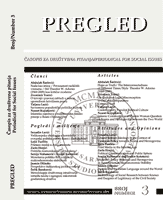Značaj i opšte karakteristike Ustavnog zakona iz 1953. godine
Significance and General Characteristics of the Constitutional Law from 1953
Author(s): Selim HasovićSubject(s): Law, Constitution, Jurisprudence
Published by: Univerzitet u Sarajevu
Keywords: Constitutional Law; Law on Labor Relations; selfmanagement
Summary/Abstract: The Constitutional Law from 1953 confirmed the National Boards as the basic structures of authority of the working people and senior structures of the municipality, city and circuit, and that “workers’ selfmanagement in the municipality, city and circuit is the basis of the social and political structure of the country”. The Constitutional Law is not merely a cabinet work or a simple legal regulation. It included basic principles and provisions (adopted from practice, then generalized and legalized), which allowed and facilitated the rapid development of new principles and institutions. The Constitutional Law is divested of declamatory statements and verbal declarations. The Constitutional Law was a principled and realistic legal act. The Constitutional Law clearly defined the rights of the Federation and the republics in relation to the national boards. The Federal Constitutional Law precisely defined the authorities of all federal structures, while the republic constitutional law defined the rights and responsibilities of republic structures. The Federal Constitutional Law defined the selfmanagement rights of the National Boards. Thus, these rights were given constitutional-legal significance, which ensured that they could not be changed by federal or republic laws. The most important self-management rights of the National Boards defined by the Federal Constitutional Law included: the right of citizens to appoint and withdraw their representatives in the municipal national board and the circuit city councils, as well as the right of producers to appoint and withdraw their representatives in the council of producers in the national board of the circuit or city, the right of citizens and producers to be appointed to the national board, the right of citizens to directly participate in government through referendum, voters’ assembly, council of citizens, their participation in the administration and judiciary and through other forms of direct management, in the right of the national board to independently organize affairs of general interest for the community in the field of economic, communal social and cultural life and development of the municipalities, city and circuit, to rely on economic organizations, self-management institutions, associations and initiative of the citizens, the right of the national board to independently control a portion of the revenues provided by economic organizations to the municipality, city and circuit, but in accordance with the republic social plan, the right of the national board to independently adopt the social plan, the right of the national board to perform legal obligations towards economic organizations on its territory, the right of the national board to manage national property.
Journal: PREGLED - časopis za društvena pitanja
- Issue Year: L/2009
- Issue No: 3
- Page Range: 287-300
- Page Count: 14
- Language: Bosnian

